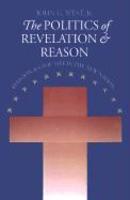
Book Summary
In recent years, controversies over abortion, school prayer, and religious cults have raised new questions about the delicate balance between church and state, between true believers and civic authority. John West shows that America's Founders had already anticipated and answered such questions by carefully defining religion's proper role in politics. West sheds new light on how the Founders tried to solve this fundamental theological-political problem and shows to what extent their solution worked in practice in the early decades of the new nation. West contends that the Founders and their immediate successors encouraged religion to play a dynamic, positive role in politics. This was not surprising, he argues, because in that era both church and state supported civic authority through a shared moral vision. This can clearly be seen, West demonstrates, in Christian political activism from the election of 1800 to 1835--a period that witnessed evangelical challenges to Cherokee removal, the delivery of Sunday mail, dueling, and other practices evangelicals deemed inconsistent with the moral order. These reform-minded evangelicals, West argues, were the period's most politically active religious adherents and thus provided the most stringent test of the Founders' attempts to devise a solution to the theological-political problem. Illuminating these neglected episodes in the history of religion and politics, West adds enormously to our understanding of early American church-state conflict. As such, his book will be enlightening for anyone interested in the political role of religion in America's past, evangelical religion in contemporary politics, and the current "culture wars." This book is part of the American Political Thought series.
Book Details
| Book Name | The Politics Of Revelation And Reason: Religion And Civic Life In The New Nation |
| Author | John G. West |
| Publisher | University Press Of Kansas (Dec 1996) |
| ISBN | 9780700611164 |
| Pages | 320 |
| Language | English |
| Price | 1034 |








